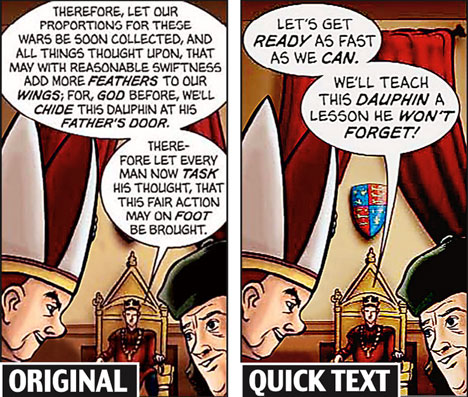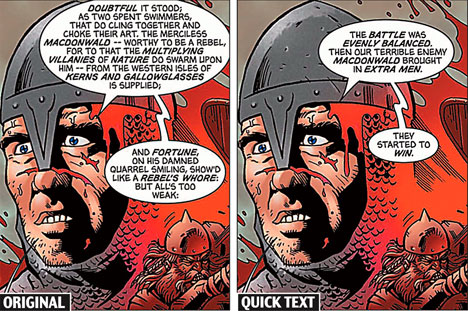In Other Words
Via News on the Rialto we find an article about comic book versions of Shakespeare’s plays with updated simplified language:
Shakespeare’s plays are being rewritten as comic strips for pupils who find his poetry boring, it emerged today.
Thousands of teenagers are to study cartoon versions of famous plays such as Macbeth which reduce finely-crafted passages to snappy phrases.
The publishers hope the comics – illustrated by artists who have worked on the Spiderman series – will inspire disaffected readers with a love of the Bard’s plays.
No disrespect to Spiderman, but this won’t instill anyone with a love for anything, and certainly not the Bard’s plays. Shakespeare writes using the language of poetry, which means that every word choice is significant. The interplay, music, and structure of the language is fundamental in Shakespeare’s development of plot, character, and theme. You can’t just use your Spidey sense to paraphrase this stuff and call it Shakespeare.
The Shakespeare Geek demonstrates why.
I actually like the idea of comic book versions of Shakespeare plays, as long as they use the original language. You can even abbreviate the language in comic book form. But once you take away the language, you are no longer reading Shakespeare. It’s not even dumbed-down Shakespeare. You may as well just read something else.
For example, you may wish to read these comic books that deal with delicate problems for children. It seems that even Spiderman has a secret.
That’s what you get for messing with Shakespeare.


August 23rd, 2007 at 10:59 pm
Comic books have a place, certainly. My 5yr old daughter flips through the comic version of The Tempest and can recognize the characters and the general plot. As she learns how to read I’d rather she understood what she was reading. I have a comic of Taming of the Shrew, but I think the concepts are a little adult for her.
Let me reiterate – she’s *5*, not 15. I’ve introduced her to Shakespeare in this way, at this young age, so that by the time she gets to school and has to study the real thing, she’ll say “Oh, sure, I know this story, this is what my dad used to tell us at bedtime….” and one major hurdle will be cleared.
My 3yr old, by the way, gets Sonnet 18 as a lullaby. I’ve learned from experience that after I sing a song enough, she will memorize it and sing it back to me. The day that she sings “Shall I compare thee to a summer’s day?” back to me, I swear to god I will fall down dead, my heart exploding from the rapture of it.
My 15month old gets “What a Piece Of Work Is Man” from the HAIR soundtrack. He’s got a little while to go yet. I also have to find some more manly stuff for him. Maybe something from Richard III?
http://www.shakespearegeek.com
August 28th, 2007 at 8:57 am
I think I’d go with Henry V. Very manly.
Start with the St. Crispin’s Day speech. You can call it the Rice Krispies Day speech if that will help. “Once more into the breach” can be a helpful speech when potty training. And it’s never too early to start teaching them French.
Helpful hints from your friendly neighborhood Shakespeare Teacher.
January 6th, 2013 at 2:46 pm
[…] And, far from being lost in the informational-text shuffle, Shakespeare now becomes the man of the hour. As the only author explicitly required by the Common Core, Shakespeare must be taught in grades 11 and 12 (see page 38, right column, Standards 4 and 7). Shakespeare is also included in the recommended texts for grades 9 and 10 (see page 58, left column, center). And Shakespeare is not excluded for younger students either, as the standards outline only the minimum of what must be taught in each grade. The Common Core does stress using authentic texts, so updated language versions of Shakespeare would be frowned upon, but that’s actually an adjustment I can get behind. […]